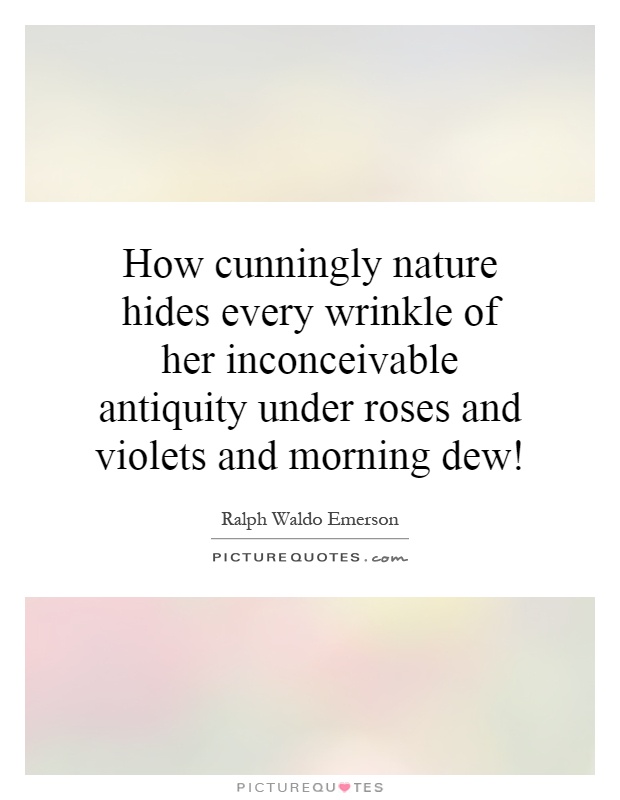How cunningly nature hides every wrinkle of her inconceivable antiquity under roses and violets and morning dew!

How cunningly nature hides every wrinkle of her inconceivable antiquity under roses and violets and morning dew!
Ralph Waldo Emerson, a prominent American essayist, poet, and philosopher, was known for his profound insights into the natural world and the interconnectedness of all things. In his essay "Nature," Emerson explores the beauty and mystery of the natural world, and how it can serve as a source of inspiration and spiritual renewal for humanity. One of the most striking passages in this essay is when Emerson writes, "How cunningly nature hides every wrinkle of her inconceivable antiquity under roses and violets and morning dew!"This quote encapsulates Emerson's belief in the transformative power of nature, and how it can serve as a veil that conceals the vastness of time and the mysteries of the universe. By using the imagery of roses, violets, and morning dew, Emerson suggests that nature has a way of masking its age and complexity with beauty and simplicity. The delicate petals of a rose or the shimmering dewdrops on a leaf can distract us from the ancient wisdom and unfathomable depths that lie beneath the surface.
Emerson's words also speak to the idea that nature has a way of renewing itself and constantly evolving, despite its ancient origins. The cycle of growth, decay, and rebirth that is inherent in the natural world is a testament to its resilience and adaptability. Just as a rose blooms anew each spring, so too does nature continue to reinvent itself and reveal new wonders to those who take the time to observe and appreciate its beauty.
Furthermore, Emerson's quote highlights the idea that nature has a way of transcending human understanding and challenging our preconceived notions of time and space. The roses and violets that bloom in our gardens may seem ephemeral and fleeting, but they are also a reminder of the enduring power and majesty of the natural world. In this sense, nature serves as a mirror that reflects our own mortality and impermanence, while also offering us a glimpse of something eternal and timeless.
Overall, Emerson's words remind us of the profound mysteries and hidden depths that lie within the natural world, and how it can serve as a source of wonder, inspiration, and spiritual enlightenment for those who are willing to look beyond the surface. By appreciating the beauty and complexity of nature, we can gain a deeper understanding of ourselves and our place in the universe, and perhaps catch a fleeting glimpse of the infinite wisdom that lies just beneath the surface of a rose or a violet.












 Friendship Quotes
Friendship Quotes Love Quotes
Love Quotes Life Quotes
Life Quotes Funny Quotes
Funny Quotes Motivational Quotes
Motivational Quotes Inspirational Quotes
Inspirational Quotes